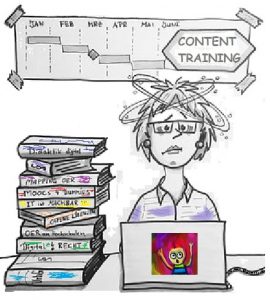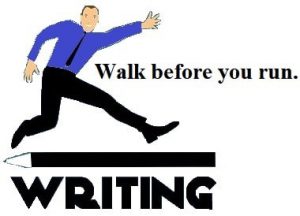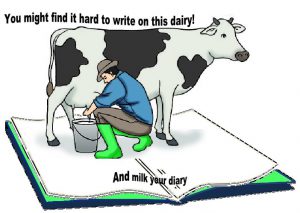
Creating Content for your website is one topic I have been working on for a while. You see you can have really good content but horrible formatting fringe impacts that lessen the article’s quality.
So I will try to present this in a way that helps you and isn’t confrontational to anyone. Because the incorrect fringe impacts of poor spelling and grammar, along with typing mistakes and the choice of the wrong words can hurt your content big time. Especially if there are too many of them. And I do admit to making these at times. In my case mostly typing mistakes. (Gremlins in my fingers!)
A note here is that any article I do is reread several times. Spelling and grammar checked at least twice. And finally given to several other people to read, comment on and give feedback. This intercommunication and help is a wonderful part of the group, Wealthy Affiliate that I am a member of (along with over a million other members).
I will illustrate the impact by using some examples from my latest read where I experienced poor fringe impact. These examples are from a recent Science Fiction book. Previously I had read the first three books in the same series. The tale was great so I ploughed into book 4. Only to come to a sudden halt not far in.
The poorly formatted content was so disrupting I had to force myself to continue reading. I only did that based on the previous books. If it had been an independent book, it would have ended up in a garage sale.
Among other information, within this article, I will highlight some of these little but accumulative fringe impacts
How to Attract Visitors

You can learn to set your website up in such a way that you attract visitors who have already done their research and decision. These ones are ready to buy.
For these visitors your attraction will be the in-depth (that is really specific) information on the subject they have searched out. You need to do this in a very enticing manner as you do have competition. Mind you, there is a huge potential audience for you too.
Now I certainly agree keywords are important but don’t get bogged down in them! Never forget that every word you use is a potential keyword albeit some are more important than others.
Once you get an idea, it’s often best to start ‘doodling’ around with your idea. Research and write. Talk over the idea with your ‘invisible’ friend (an Avatar if you like). You will get many ideas from doing this.
This is really what I do. Generally, along the way the target keyword rises through the notes and it is usually absolutely right for your content.
When you do this, even if the most suitable keyword isn’t the quite the thing you can use it to get more ideas.
My site name is a perfect example of this. I was playing around with what I wanted to help people with. As I have a great love of living in new places I thought I should do something for people who wanted to work in new places.
Initially I was humming Lou Reed’s Take a Walk on the Wildside. Suddenly Working on the Wildside came into my head. I checked it out on Wealthy Affiliate’s Jaaxy keyword Search Tool. Well it was perfect. And not only that when I viewed available domains the one workingonthewildside.com was available. I grabbed it immediately.
What I am saying here is you really need to find a niche, target keyword and site domain that comfortably matches. This way your content will have a head start in the quality field and will almost certainly portray that your article contains the information that your visitors are looking for and draw them to your site.
It is in fact an authority site.
Writing Inspirational Content that gives Visitors a Comfortable Read

You have developed your notes so get them into a logical and flowing pattern. Once again do this as if you are actually having a conversation with a friend or person who is really easy to talk to.
If at any time you feel your content is becoming a bit forced, put your pen down or close up your laptop and go for a walk. When you mostly write your content well and naturally, if there is any forced content it will stand out like a sore thumb.
A further point is to make sure the sentence makes sense. From the previously mentioned book, Drifter Prime by Brett Fitzpatrick, I have taken a rather convoluted sentence to show you how unordered content (in this case a dangling participle) within a sentence can impact on the meaning. And I reiterate here that his previous 3 books were mostly pretty spot on with the English.
“Brax had them form up in a garage below the science station in dribs and drabs, as they arrived.” This sentence implies that underneath the station there is a garage that contains the physical features called dribs and drabs. (Maybe the alien speak for cupboards and rooms!)
An alternative for this sentence would be ‘As they arrived, in dribs and drabs, Brax had them form up in the garage below the science station’. And you can bet this can be rewritten another way too!
Strangely enough the usual impact of these dangling participles is often quite amusing but certainly not accurate! To explore what these are and have a bit of a laugh I find the About Quick and Dirty Tips site very helpful with all sorts of grammar information.
Remember, the whole point of your website should be how to guide people to what they have been looking for. By the time they get to your site after hitting the search engines, most of them know exactly what they are looking for. What they need is for you to give them suggestions on what’s the best for them.
Content Checking Requirements to Give Visitors a comfortable read.
Back to the outlandish fringe.

First of all I want to remind you be thorough. Don’t race ahead until you are confident your writing isreally well done. The old adage, Haste Makes Waste, is very true.
When you are writing, there are a number of issues you should keep in mind. A lot of these are not just online issues. I have been part of panels that interview prospective employees. The following have often meant the applicants are removed from the potentials list.
No matter the job is, good writing is often part of it.
Just remember who your audience is and don’t limit it by the words you use and how you present them. One example of this is the way words have been slurred and shortened. Such as wanna and gotcha. I know of course this is the slangy shortened words for want to and got you. With a huge potential audience out there, can you guarantee all will know this? If you are like me you want to attract as many visitors as you can so don’t truncate, with lazy speech, the number of these visitors.
Respect the English language of other countries. For example I use Australian English. I used to use Canadian when I lived over there. But I do know that American English has been altered over the years from the original Commonwealth English. So I understand and accept that and don’t worry about it.
One more word on that is, use the type of English that the country you live in uses. Traveling a lot I didn’t have much call for writing. When I went to university I used an Australian/Canadian Hybrid (with a bit of American thrown in). One of my lecturers crossed all non-Australian words out and had me rewrite my assignment. I got over that fast enough.
Avoid these content issues:
Here are some of the more common mistakes. Some of these don’t seem like much but added together, they can make for a very tedious read.
- Never, ever not proof read your article. Always do a spelling and grammar check. This won’t catch everything but will go a long way to smoothing out those eye-catching hiccups.
Another example via the above book; “Does it loo safe, shall we begin to follow”. Over here in Australia a loo is a toilet, dunny, backhouse, outhouse or one of those others meaning the place you relieve yourself. Any guesses on what that word should be?
The moral of this example is ‘don’t drop your letters’. The result might actually be a word and therefore not generally caught by a spell check. Even the grammar check might miss it unless it realises the word is out of context.
- Don’t use texting short cuts. Remember with such a wealth of occupations out there one person’s short cut is another person’s different short cut. While I realise that most of the following really aren’t texting shortcuts, as those are mostly single letters or symbols (eg u = you, 8 =ate), there are a great number of letter short cuts over the various occupation fields. I am using these to show you the broad and varied meanings of the same letters.
This occurs especially with acronyms. Yes some of these are very individual and well know across the English-speaking world. And probably occur in many other languages.
For instance:
– AC = Alternating Current in the electrical area,
– AC = Axiom of Choice in the mathematical field,
– AC = Before Meals (from Latin ante cibum)
– AC = Across Corners of a hex nut in the engineering area, or
– AC = Half of a Rock and Roll band!
– BC = a Canadian province, while
– BC = a Bolt Circle
– HRS = a Hot Rolled Sheet, or
– Hrs = hours
And so on
I don’t say don’t use them, but do explain them in the first usage. EG ‘… Alternating Current (AC) …’.
Some acronyms are fine as they are unique and have become established ‘words’ that most know.
– Examples are words like SCUBA (one of the well know acronyms). Generally it is safe to use this one but make sure it suits the part.
Further Things not to do When Creating Content.
I have encountered all these sorts of slip-ups both in the book I previously referred to and also in many websites. Including mine. No matter how many proofreads I do there is always something else to fix.
- Choosing the wrong form of words eg using replaces instead of replaced. Replaces is current tense and replaced is past tense (ie it has already happened).
- Mixing up adjectives and adverbs. For example the word Real in itself is an adjective and works with nouns or pronouns. Really is an adjective and works with verbs, adjectives or other adverbs. The bottom line of this is that real good is a no-no while really good is a yes-yes!
Back to our example book with this issue. “Whoa,” Knave’s voice came over the communicator, “that’s a negatory.’ Now I have to admit, this is a new one on me. Negatory is an adjective. Adjectives describe nouns.
This sentence immediately follows the one, mentioned previously, about the ‘loo’. I find it hard, even looking at the two sentences, to actually pick out the word/s negatory defines. I would have used ‘negative’. Maybe I am right, or not!
Now if this confuses you as much as it often does me, then get yourself a good grammar book. Kobo has eBooks on promoting yourself with good grammar. You might want to obtain one of these.
By the way, I have used The Little Blue Book of Grammar and Punctuation in the past. That’s not a bad place to start but it does tend to mix up proper form and style. You can get this from Kobo Australia or Kobo US.
I have just discovered another book, The Little Green Grammar Book. It sounds pretty good so I am about to get myself a copy from booktopea
- Watch out for wrong words. This often occurs with same sounding words, spelled differently and with differing meanings.
For example, bare instead of bear.
Again from the above mentioned book, “She could hardly bare to look at the display …”.

Now that drew a chuckle. Of course the person referred to could bare it. But could they bear to bare it. Probably not in this case as it would be mighty cold!
Recently I had a comment on a post I did on using a diary for your website. Well what happens when your diary turns into a dairy. I also got a chuckle from that. Maybe the cow will have to be taught to write while being milked! I hope his aim is good or you will end up with quite a soggy diary.

Wow What Great Content
Now that you have created your smooth, naturally flowing content, and watched out for the above issues, read it again. Maybe have a cluey English fluent friend read it too. A new set of eyes will always help you improve your article.
Finish polishing it off with some really illustrative images.
Take a look at my Wealthy Affiliate Review about the best all-around platform for building a website and having excellent content 
Share This

Thank you for a brilliant, humorous post!
I am still trying to work on getting traffic to a site I have, I think I have got bogged down with keywords as you have eluded to. I think that has affected my writing frequency.
Andy, I am the queen of bogged down. I like to be as perfect as possible so edit continually until I finally admit enough is enough!
I tended to worry about keywords when I first started but don’t now. It’s fantastic when a keyword turns up that is just so right. But with so many people doing similar articles it’s hard to be unique. Just keep on trucking.
If you have an article in mind, just write it out. I can almost guarantee by the time you have added, subtracted and organised your writing of it there will be a great change in it.
Then go through and find phrases that look good and are relevant. Then Jaaxy them. Use the best as your target. That will tighten your title and article content together.
Have fun and get that frequency up. (Mind you I need to do that at the moment too).
Thanks for your comment.
Ciao
Helen
Hey theres some great tips here, even though they’re simple a lot of us forget to do it, I am a culprit of that aswell, always trying to shorten things down naturally or turning it into slang saying “gonna” instead of “going to” haha.
Kourtney, yes why take the hard road when there is an easy one. I tend to shorten things. This has been going on for so long it seems natural now.
I also use Australian terminology but do explain it in brackets. Aussie slang is so colourful at times. It’s fun to use.
Sometimes, when traveling in a country, the speech and accent between two areas is so different it is impossible to fully understand. And that’s in English. Imagine where we will end up if this continues. A few kilometres apart, some villages won’t be able to understand each at all!
I really appreciate your visit and comment.
Thanks
Ciao
Helen
Hi Helen, Thank you for this very good article on Creating Great Content. It is shocking to see the type of content in some books and the one you are quoting from is an example of very poor writing. Can’t think that it went for editing before printing. Perhaps they forgot?
Jill, it looks like your thoughts on this reflect mine. A lot of the mistakes could have been fixed with a simple spell check. Words were run together or split in odd places, among other things.
Someone named on one page had a different name on the next. At least; in the context that appears what happened.
Mind you I do love hanging/dangling participles. At times these are the best thing in a book as they add so much humour.
Thanks for commenting.
See you around.
Cioa
Helen
Thanks for sharing these tips. I have recently started using Grammarly to check my content to ensure my spelling and grammar are accurate. My main problem is that my writing style starts off naturally but then ends up sounding as if I am a professor lecturing to an audience.
I have a tough time balancing the line between being friendly/approachable and being an “authority” in my niche. I absolutely love the idea of having an Avatar to “talk” to when I am writing.
Thanks again!
Max, I tend to have the same issue. I wouldn’t worry too much about being an authority. What I do is write out my article, then go over it several times. Not to add so much as to make anything too lecturing into a natural flow. Sometimes it is as easy as looking up alternative words. Just take your lecture and make yourself the avatar for a while. Then rewrite as if you know nothing about the topic and how you would like it explained to you. Remember when you were young, getting frustrated when the explanations weren’t quite the basics.
Just remember you are friendly and approachable!
Thanks for your well thought out comment.
Ciao
Helen